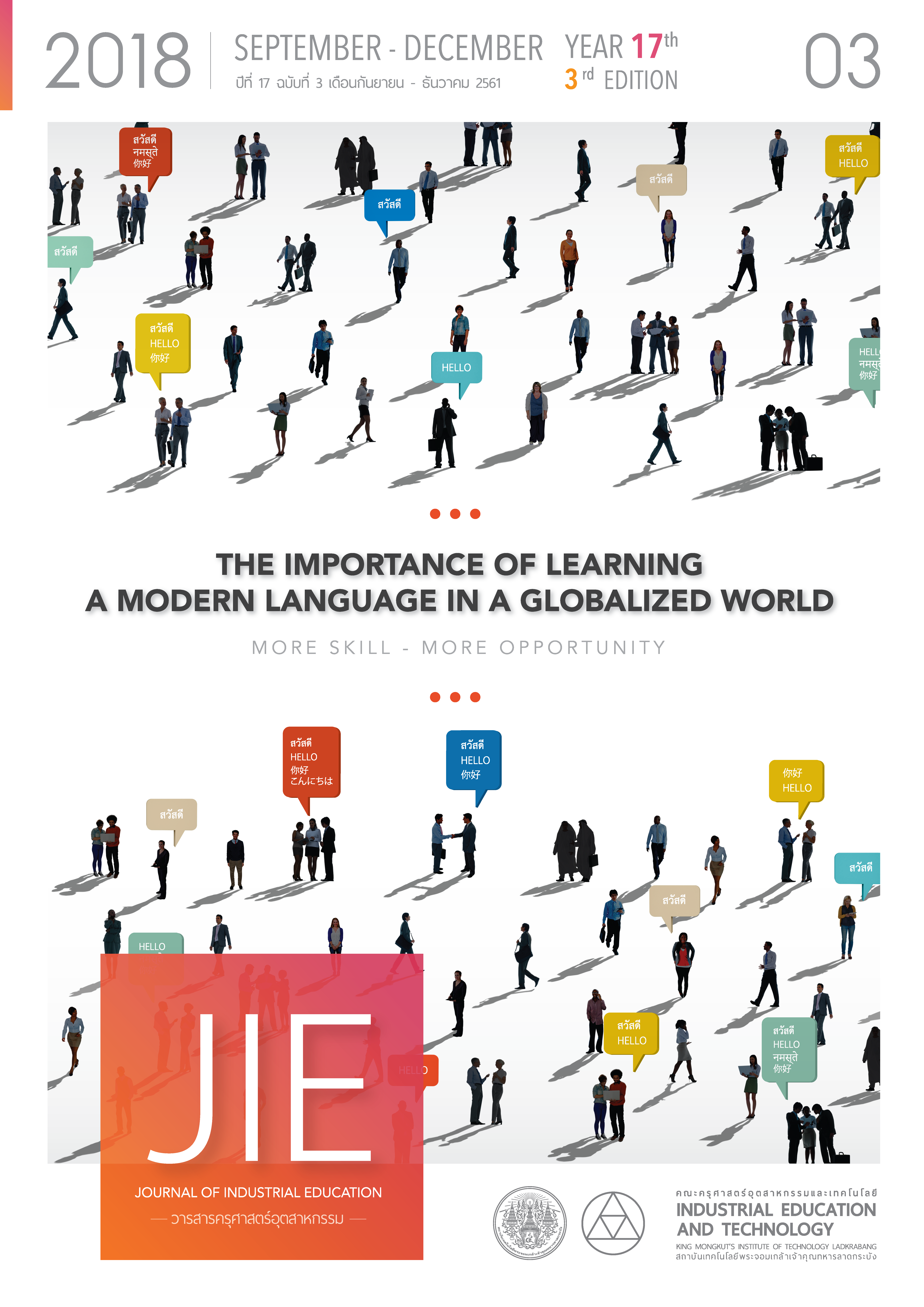EFFECTS OF FLIPPED CLASSROOM AND GAMIFICATION ON ABILITY IN APPLYING COMPUTER KNOWLEDGE OF UPPER SECONDARY SCHOOL STUDENTS
Keywords:
flipped classroom, gamification, applying computer knowledge, codingAbstract
The objectives of this study were to 1) compare ability in applying computer knowledge of upper secondary school students before and after learning with flipped classroom and gamification, and 2) compare ability in applying computer knowledge of upper secondary school students learning with flipped classroom and gamification with those learning by conventional instruction. The sample group was tenth grade students of an extra-large secondary school in Secondary Educational Service Area Office 1 in the first semester of the academic year 2018 through purposive sampling into 2 classrooms. The students were divided into two groups: an experimental group of 35 students learning with flipped classroom and gamification and one controlled group of 30 students learning with conventional instruction. 16 periods of teaching, the instruments for data collection were the ability in applying computer knowledge test; before learning, its reliability (alpha coefficient) is 0.84. Data were analyzed by using arithmetic mean, standard deviation and t-test. The results of study revealed that 1) the ability in applying computer knowledge of students, after learning with flipped classroom and gamification was statistically higher than those before learning at a .05 level of significance and 2) the ability in applying computer knowledge of students of student using flipped classroom and gamification group were higher than those learning activities with a conventional approach at a .05 level of significance.
References
[2] Enger, S. K., & Yager, R. E. 2001. Assessing student understanding in Science: A standards based K-12 handbook. In Thousand Oaks. Calif: Corwin Press.
[3] Phimphan Dechakhup and Phayao Yindisuk . 2014. Teaching in the 21st century. Bangkok: Chulalongkorn University Printing House.
[4] Ministry of Education. 2008. Core Curriculum Basic Education of Career and Technology 2008. Bangkok: Office of Academic and Educational Standards.
[5] Institute for the Promotion of Teaching Science and Technology. 2017. Core Curriculum Basic Education of Science (Updated edition 2017). Bangkok: IPST.
[6] Bergmann, J., & Sams, A. 2012. Flip your classroom: Reach Every student in every class day. Washington DC: International Society for Technology in Education.
[7] Wichan Panich. 2013. Teacher for students create Flip Classroom. Bangkok: S.R. Printing mass product.
[8] Suphattha Uttamang 2015. Flipped classroom: A dream come true in teaching Thai language. Journal of Education Srinakharinwirot university, (16)1, p.51-58.
[9] Jintavee Khlaisang. 2002. E-Learning Courseware Bangkok: Chulalongkorn University Printing House.
[10] Glover, I. 2013. Play as you learn: gamification as technique for motivating learners. Proceedings World Conference on Educational Multimedia, Hypermedia and Telecommunications, Chesapeake, Va.
[11] Kapp, K. M., Blair, L., & Mesch., R. 2014. The gamification of learning and instruction: fieldbook idea into practice. San Francisco, CA: Wiley.
[12] Tenneson, M., & McGlasson, B. 2006. The Classroom Flip. USA: Fontbonne University.
[13] Chanthima Patthamathamkun. 2013. Flipped Classroom/Interviewer. King Mongkut's university of technology Thonburi.
[14] Chanut Poondej and Thanita Lerdpornkulrat. 2015. Learning management with the gamification concept. Journal of Education Naresuan University, (18)3, p.331-339.
[15] Jantima Jaroenphon. 2013. Development of an interactive video streaming system based on gamification concept with mastery learning to enhance self-regulation ability in undergraduate students. Thesis M.Ed. (Educational Technology and Communication), Education, Chulalongkorn University.
[16] Chuthamas Meesook 2015. The learning activities to enchance student engagement by appying gamification technology on information and technology course for Enrichment Science Class student Mathayomsueksa IV Anukoolnaree School. Thesis M.Ed. (Computer Education), Education, Rajabhatmahasarakham University.
[17] Eakphisitdha Uttra, Punnee Leekitchwatana and Thiyaporn Kantathanawat. 2018. The Development of an E-learning on Loop Statement Programming for Grade 10. Journal of Industrial Education, (17)1, p.45-51.
[18] Desforges, C., & Lings, P. 1998. Teaching Knowledge Application: Advances in Theoretical Conception and Their Professional Implications. British Journal of Education Studies, (46)4, p.386-398.
[19] Johnsom, L.S. 2005. From knowledge transfer to knowledge translation: Applying research to practice. Ottawa: Caot Publication Ace.
Downloads
Published
How to Cite
Issue
Section
License
"The opinions and contents including the words in papers are responsibility by the authors."
"ข้อคิดเห็น เนื้อหา รวมทั้งการใช้ภาษาในบทความถือเป็นความรับผิดชอบของผู้เขียน"



